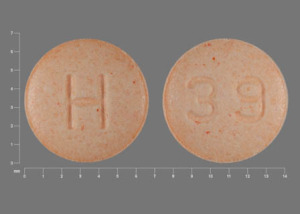Hydralazine Disease Interactions
There are 6 disease interactions with hydralazine.
- Bone marrow suppression
- Coronary artery disease
- Lupus erythematosus
- Valvular heart disease
- Cerebral vasculopathy
- Renal dysfunction
Hydralazine (applies to hydralazine) bone marrow suppression
Major Potential Hazard, Low plausibility. Applicable conditions: Bone Marrow Depression/Low Blood Counts
Hydralazine may rarely cause blood dyscrasias at recommended dosages. Reduction in hemoglobin, red cell count, agranulocytosis, leukopenia, and purpura have been reported. Therapy with hydralazine should be administered cautiously in patients with these preexisting conditions and if such abnormalities develop during the course of therapy, treatment should be discontinued. Monitoring blood counts should be considered for those patients at higher risk.
Hydralazine (applies to hydralazine) coronary artery disease
Major Potential Hazard, High plausibility. Applicable conditions: Ischemic Heart Disease
The use of hydralazine is contraindicated in patients with coronary artery disease. Reflex tachycardia may commonly occur. Palpitations and chest pain have also been reported. Myocardial infarction has been associated with the use of hydralazine.
Hydralazine (applies to hydralazine) lupus erythematosus
Major Potential Hazard, High plausibility.
The use of hydralazine has been associated with the development of lupus erythematosus and lupus-like syndromes, as well as exacerbation of the disease. Hydralazine therapy should be withdrawn in patients experiencing worsening of preexisting lupus. Monitoring complete blood counts, and antinuclear antibody titers before and during prolonged therapy is recommended.
Hydralazine (applies to hydralazine) valvular heart disease
Major Potential Hazard, High plausibility.
The use of hydralazine is contraindicated in patients with mitral valvular rheumatic heart disease.
Hydralazine (applies to hydralazine) cerebral vasculopathy
Moderate Potential Hazard, Moderate plausibility. Applicable conditions: Cerebral Vascular Disorder
The vasodilatory effects of hydralazine may aggravate cerebral vasculopathy. Therapy with hydralazine should be administered cautiously in patients with cerebral vasculopathy.
Hydralazine (applies to hydralazine) renal dysfunction
Moderate Potential Hazard, Moderate plausibility. Applicable conditions: Glomerulonephritis
The use of hydralazine has been associated with the development of glomerulonephritis. Hydralazine should be used with caution in patients with advanced renal damage and these patients may require a lower dose. Renal function should be monitored and supported as required.
Switch to professional interaction data
Hydralazine drug interactions
There are 413 drug interactions with hydralazine.
Hydralazine alcohol/food interactions
There is 1 alcohol/food interaction with hydralazine.
More about hydralazine
- hydralazine consumer information
- Check interactions
- Compare alternatives
- Pricing & coupons
- Reviews (93)
- Drug images
- Side effects
- Dosage information
- Patient tips
- During pregnancy
- Drug class: vasodilators
- Breastfeeding
- En español
Related treatment guides
Drug Interaction Classification
| Highly clinically significant. Avoid combinations; the risk of the interaction outweighs the benefit. | |
| Moderately clinically significant. Usually avoid combinations; use it only under special circumstances. | |
| Minimally clinically significant. Minimize risk; assess risk and consider an alternative drug, take steps to circumvent the interaction risk and/or institute a monitoring plan. | |
| No interaction information available. |
See also:
Further information
Always consult your healthcare provider to ensure the information displayed on this page applies to your personal circumstances.


